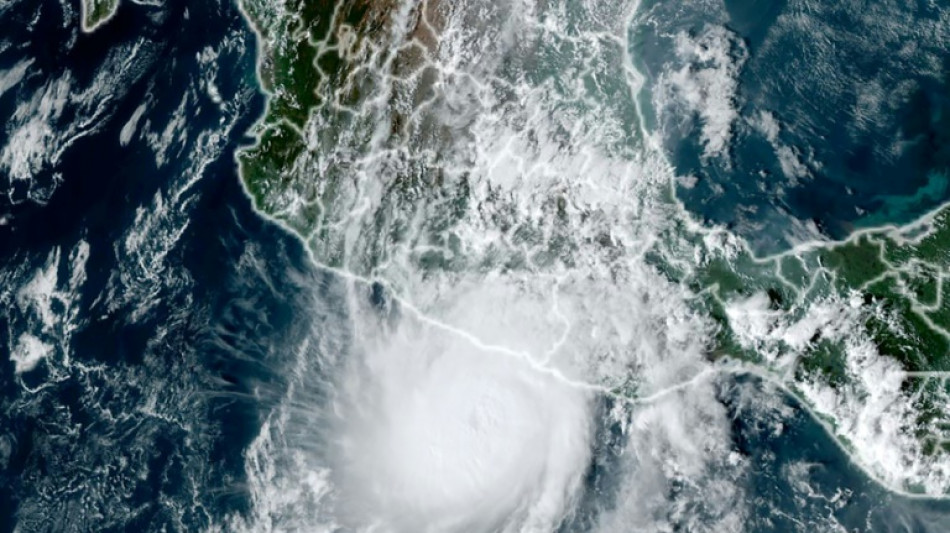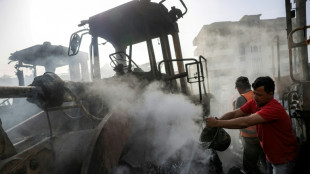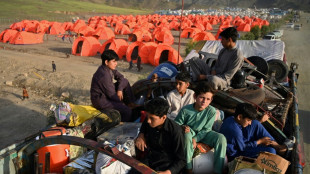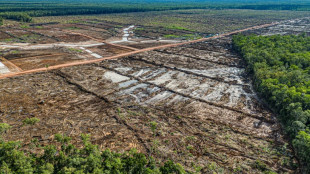
-
 US VP Vance says 'progress' in India trade talks
US VP Vance says 'progress' in India trade talks
-
Ex-England star Youngs to retire from rugby

-
 Black Ferns star Woodman-Wickliffe returning for World Cup
Black Ferns star Woodman-Wickliffe returning for World Cup
-
Kremlin warns against rushing Ukraine talks

-
 Mbappe aiming for Copa del Rey final return: Ancelotti
Mbappe aiming for Copa del Rey final return: Ancelotti
-
US universities issue letter condemning Trump's 'political interference'

-
 Pope Francis's unfulfilled wish: declaring PNG's first saint
Pope Francis's unfulfilled wish: declaring PNG's first saint
-
Myanmar rebels prepare to hand key city back to junta, China says

-
 Hamas team heads to Cairo for Gaza talks as Israel strikes kill 26
Hamas team heads to Cairo for Gaza talks as Israel strikes kill 26
-
Pianist to perform London musical marathon

-
 India's Bumrah, Mandhana win top Wisden cricket awards
India's Bumrah, Mandhana win top Wisden cricket awards
-
Zurab Tsereteli, whose monumental works won over Russian elites, dies aged 91

-
 Roche says will invest $50 bn in US, as tariff war uncertainty swells
Roche says will invest $50 bn in US, as tariff war uncertainty swells
-
Pope Francis's funeral set for Saturday, world leaders expected

-
 US official asserts Trump's agenda in tariff-hit Southeast Asia
US official asserts Trump's agenda in tariff-hit Southeast Asia
-
World leaders set to attend Francis's funeral as cardinals gather

-
 Gold hits record, stocks mixed as Trump fuels Fed fears
Gold hits record, stocks mixed as Trump fuels Fed fears
-
Roche says will invest $50 bn in US over next five years

-
 Fleeing Pakistan, Afghans rebuild from nothing
Fleeing Pakistan, Afghans rebuild from nothing
-
US Supreme Court to hear case against LGBTQ books in schools

-
 Pistons snap NBA playoff skid, vintage Leonard leads Clippers
Pistons snap NBA playoff skid, vintage Leonard leads Clippers
-
Migrants mourn pope who fought for their rights

-
 Duplantis kicks off Diamond League amid Johnson-led changing landscape
Duplantis kicks off Diamond League amid Johnson-led changing landscape
-
Taliban change tune towards Afghan heritage sites

-
 Kosovo's 'hidden Catholics' baptised as Pope Francis mourned
Kosovo's 'hidden Catholics' baptised as Pope Francis mourned
-
Global warming is a security threat and armies must adapt: experts

-
 Can Europe's richest family turn Paris into a city of football rivals?
Can Europe's richest family turn Paris into a city of football rivals?
-
Climate campaigners praise a cool pope

-
 As world mourns, cardinals prepare pope's funeral
As world mourns, cardinals prepare pope's funeral
-
US to impose new duties on solar imports from Southeast Asia

-
 Draft NZ law seeks 'biological' definition of man, woman
Draft NZ law seeks 'biological' definition of man, woman
-
Auto Shanghai to showcase electric competition at sector's new frontier

-
 Tentative tree planting 'decades overdue' in sweltering Athens
Tentative tree planting 'decades overdue' in sweltering Athens
-
Indonesia food plan risks 'world's largest' deforestation

-
 Gold hits record, stocks slip as Trump fuels Fed fears
Gold hits record, stocks slip as Trump fuels Fed fears
-
Trump helps enflame anti-LGBTQ feeling from Hungary to Romania

-
 Woe is the pinata, a casualty of Trump trade war
Woe is the pinata, a casualty of Trump trade war
-
'Like orphans': Argentina mourns loss of papal son

-
 Trump tariffs torch chances of meeting with China's Xi
Trump tariffs torch chances of meeting with China's Xi
-
X rival Bluesky adds blue checks for trusted accounts

-
 China to launch new crewed mission into space this week
China to launch new crewed mission into space this week
-
Morocco volunteers on Sahara clean-up mission

-
 Latin America fondly farewells its first pontiff
Latin America fondly farewells its first pontiff
-
'I wanted it to work': Ukrainians disappointed by Easter truce

-
 Harvard sues Trump over US federal funding cuts
Harvard sues Trump over US federal funding cuts
-
2025 U.S. Open Polo Championship Final Concludes American High-Goal Season, Supported by U.S. Polo Assn.

-
 'One isn't born a saint': School nuns remember Pope Francis as a boy
'One isn't born a saint': School nuns remember Pope Francis as a boy
-
Battling Forest see off Spurs to boost Champions League hopes

-
 'I don't miss tennis' says Nadal
'I don't miss tennis' says Nadal
-
Biles 'not so sure' about competing at Los Angeles Olympics


Why did Hurricane Otis 'explosively' intensify off Mexico?
Hurricane Otis caused at least 27 deaths and major damage as it battered Mexico's beachside city of Acapulco as a scale-topping category 5 storm, according to officials.
The speed with which Otis rapidly intensified took the government and weather forecasters by surprise, leaving little time to issue warnings and prepare for its arrival.
Why was Otis so devastating?
"Otis's intensification was very exceptional. It was nearly record-breaking in some ways," said Michael Brennan, director of the Miami-based National Hurricane Center (NHC).
Within hours Otis strengthened from a tropical storm to the most powerful category of the five-step Saffir-Simpson scale before hitting land early Wednesday.
Otis "explosively intensified" with peak wind speeds increasing by 115 miles per hour over a 24-hour period, according to the NHC, which issues storm warnings and forecasts.
Otis was packing maximum sustained winds of 165 miles (265 kilometers) per hour when it hit the coast, the NHC said.
The World Meteorological Organization described the hurricane as "one of the most rapidly intensifying tropical cyclones on record," only exceeded in modern times by Hurricane Patricia in 2015.
Why did Otis intensify so quickly?
"Unfortunately Otis was able to take advantage of very favorable conditions" including warm deep ocean water and a conducive atmospheric environment, Brennan said.
"The storm was able to develop an inner core and a structure that allowed it to take advantage of those favorable conditions and environment in the ocean and the atmosphere to rapidly intensify," he said.
While hurricanes hit Mexico every year on both its Pacific and Atlantic coasts, usually between May and November, few make landfall as a Category 5.
"There are no hurricanes on record even close to this intensity for this part of Mexico," the NHC had said as Otis approached the Mexican coast, warning that a "nightmare scenario" was unfolding.
Is climate change to blame?
The water temperatures off the Mexican coast that Otis encountered were 30 to 31 degrees Celsius (86-88 degrees Fahrenheit), Brennan said.
"That may be a little bit warmer than usually but not tremendously so. That area is usually quite warm and has quite deep warm ocean water this time of year," he added.
"So it's hard to necessarily attribute that particular aspect of this to climate change or global warming. We'll have to look back and do some studies," Brennan said.
Will global warming bring more devastating storms like Otis?
Brennan said that "the science on that is not terribly well resolved at this point."
"There are some studies that suggest that rapid intensification is becoming more common in a warming climate," he said.
"We are very confident that the impacts of hurricanes from heavy rainfall, flooding and storm surge are worsening in a warming climate and will continue to worsen as the climate warms," he added.
That was due to rising sea levels leading to more dangerous storm surges and a warmer atmosphere holding more moisture, resulting in heavier rainfall, Brennan said.
The UN's Intergovernmental Panel on Climate Change said in 2021 that the proportion of particularly intense cyclones (categories 4 and 5) should increase by 10 percent compared to the pre-industrial era with a warming of +1.5 degrees Celsius, by 13 percent at +2C and by 30 percent at +4C.
As a result of sea-level rise and marine flooding, more than one billion people will live in coastal cities at risk by 2050, according to the IPCC.
F.Mueller--VB


